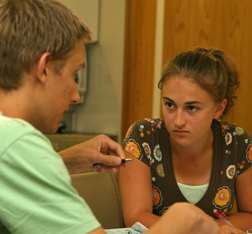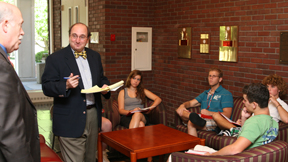The 60 rising high school seniors participating in the 2007 Opportunities to Learn About Business program have hit the stretch run.
 They’ll wake Friday morning with an overwhelming list of projects to finish as the business and marketing simulation games comes to a conclusion.
They’ll wake Friday morning with an overwhelming list of projects to finish as the business and marketing simulation games comes to a conclusion.
Click here to see pictures taken on Thursday.
The OLAB program is an intensive seven-day immersion into business. Participants — Labbies as they’re called — work from 7 a.m. through 11 p.m. each day grappling with all aspects of starting and running a business. And just like the real business world, there are bumps in the road.
The students learn basic concepts of how to work in small groups and make sales and marketing presentations. They must identify a target market and design features and benefits for a hand-held device so different from the competition that they’ll earn a niche market share that could vault them to status as industry leader.
Along the way, they learn about profit and loss, the stock market, and how a simple math mistake when managing finances can leave a firm completely broke and seeking emergency loans to continue operations.
It’s a brilliant program; a simulation game that teaches students the concepts of business as they play it, says Bert Barreto, who directs the OLAB program and is one of the primary instructors, along with Greg Shaheen, a long-time instructor and former participant.
The 60 students come from all corners of Indiana — from small, rural schools to elite private schools — and a handful come from other states. The majority are members of their high schools’ National Honor Society and about half attended Hoosier Boys State or Hoosier Girls State.
They come to OLAB thanks to the generosity of corporate and individual sponsors, who pay all of the costs for this intensely intelligent summer "camp," though very little of the OLAB program resembles anything like most summer camps. Sure, there are some recreational activities and social events, but the focus is on hands-on learning, which is why the program has continued to thrive for over 30 years at Wabash.
A range of Wabash professors, staff members, and outside consultants deliver the learning, in workshops and lectures.
Early in the week, the 60 students were broken into 12 teams (companies) with five members. Each company must create a target-specific product and determine a marketing strategy and advertising campaign that will differentiate their product from the other 11 firms selling similar hand-held devices.
 And just like all businesses, there are labor problems. Mid-week, the students faced real labor negotiators as an industry-wide "strike" loomed on the horizon. Wabash alumni — mostly attorneys and bankers — grill the student management team for the best deal for "their" union members.
And just like all businesses, there are labor problems. Mid-week, the students faced real labor negotiators as an industry-wide "strike" loomed on the horizon. Wabash alumni — mostly attorneys and bankers — grill the student management team for the best deal for "their" union members.
The result — like the computer simulation that drives the financial aspects of the game — is real, experiential learning for the students. The participants are forced to view the future of their companies through the eyes of their fictional employees. Wabash alumni like Brad Johnson, Jon Pactor (pictured), Chris Braun, David Pippen, Tim Oliver, and Rick Cavanaugh, among others, drive hard bargains and ensure that the students understand all aspects of employee relations. The high school students have to negotiate over day care facilities, fitness centers, insurance policies, paid vacations and sick days, and, of course, higher salaries and (hopefully for the firms) increased productivity.
By Friday afternoon — exhausted — the students will have completed a comprehensive advertising campaign that includes print, Internet, and television advertising.
Then — less than 24 hours before they pack up to go home — they face, perhaps, the most grueling assignment. One person from each team must deliver a 10-minute stockholder speech to a room full of their firm’s stockholders. Over the course of two hours, each team will explain to all of the other participants how their firms fared over the course of the week — and two fictional fiscal years of operations. If they are good, these reports incorporate every learning element of the week, from business ethics to working in an environmentally sensitive climate, and from the difficult labor negotiations to the very real, cold financial aspects of profit and loss.
The students will graduate from the program Saturday afternoon in a 3:00 p.m. ceremony in the Lewis Salter Concert Hall in the Fine Arts Center.